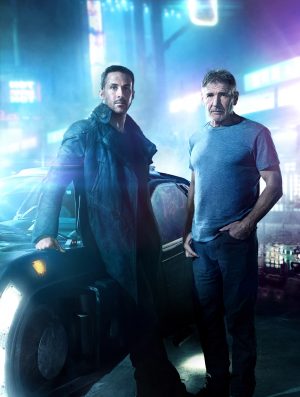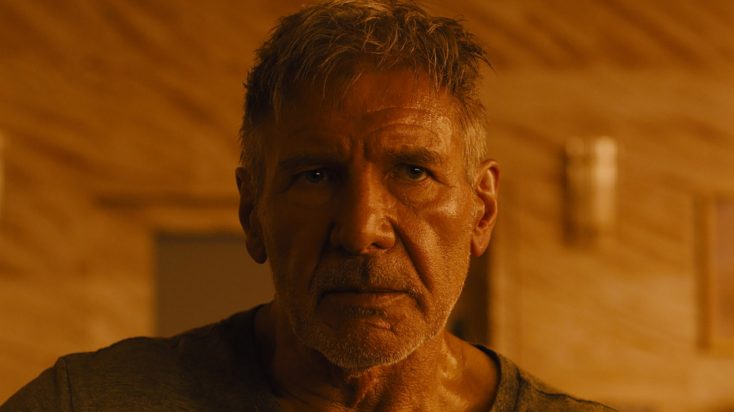
(L-R) RYAN GOSLING as K and HARRISON FORD as Rick Deckard in Alcon Entertainment’s action thriller BLADE RUNNER 2049. ©Alcon Entertainment.
By ANGELA DAWSON
Front Row Features
HOLLYWOOD—It may be one of the longest waits for a Hollywood sequel but, at last, the follow up to Ridley Scott’s groundbreaking 1982 sci-fi thriller “Blade Runner,” based on a Philip K. Dick novel, is set to hit movie screens. Reprising his role as Rick Deckard, previously an LAPD officer assigned to hunt down artificially manufactured humans (known as replicants) but who ends up questioning what it means to be human, is Harrison Ford.
“Blade Runner 2049,” directed by French Canadian filmmaker Denis Villeneuve (“Arrival”), is set 30 years after the original. Deckard has vanished. Enter a new blade runner (a euphemism for a replicant tracker), K, played by Ryan Gosling (“La La Land”). Lonely but coolly efficient, K’s job is to track down illegal replicants and “retire” them. For decades, Deckard has been one of the more elusive ones but, one day, on a routine mission to eliminate an old-model replicant, K stumbles upon a mystery that may lead him to the rogue former policeman.
Gosling was not only the filmmaker’s top choice to play a new blade runner, but he also was Ford’s pick as well.
“I thought K would be a good part for Ryan and was very enthusiastic about proposing that to the producers,” Ford says, adding that Gosling didn’t disappoint.
Similarly, Gosling has nothing but praise for his co-star. “There are many ways to play any given scene, but when you work with Harrison, you realize there’s only one great way. And he’s already figured it out before anyone else.”
Ford, who in recent years has reprised his Han Solo character from the “Star Wars” films and the title character from the “Indiana Jones” films for a new generation of fans, says “it’s kind of fun to play a character 30 years later.” He likens it to trying on old clothes that still fit. “I didn’t have any apprehensions about playing Deckard again,” he adds.
During a press conference, the venerable actor spoke about reprising his Deckard character and why he wanted to return to that character.
Q: Making this new film, did it bring back memories of the work you did on the original?
Ford: It did bring back memories of the first film. It was raining, like, all the time. I was tired but I was happy at the result, and it was remarkable experience working with Ridley (Scott, who serves as executive producer on the film). But it was a long time ago in a world far far away.
Q: This film and the original stand out because they are so incredibly visually stimulating. They have this incredible look. As an actor, how important is that for you to get into the character, to get into the role, to have that visual impact? And is there another character from other film you’ve played in the past that you would also like to re-visit?
Ford: A picture is worth a thousand words, and when you get on a set where there’s been a lot of thought put into the visual aspects of it for that scene, you feel the support from it and you know what you don’t have to do. You have to be there, of course, for the other characters and service the story. But so much is done in a visual way to certainly that encourages your confidence. And, as far as if there’s another character I’d like to revisit from the past, right now none that I can figure.
Q: By returning to play Deckard, what did you hope to accomplish?
Ford: This presented different opportunities to give the audience a better understanding of the character. To be part of the telling of the story. And I was anxious to work with the people involved—with Ryan (and) Denis. So, for me, it was a great opportunity.
Q: How often have you thought about Deckard over the last 30 years and where Deckard might be?
Ford: Well, first of all, there were a variety of endings (of the original) and it ended with Ridley’s “Final Cut.” I was much happier with that version than the one with the voice over and sailing into the sunset. I’ve thought about it frequently because I’ve been reminded of how many filmmakers took inspiration from that film and how much it defined a certain kind of fatal storytelling (and) how strongly the effect of that film has been on our culture. And the prescience of how many things that were imagined might be part of the future. It’s had a huge influence on our culture and my life.





